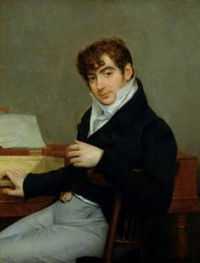Pierre-Joseph-Guillaume Zimmermann

Pierre-Joseph-Guillaume Zimmermann, (17 March 1785 – 29 October 1853), known as Pierre Zimmerman and Joseph Zimmermann, was a French pianist, composer, and music teacher.
Biography
Zimmermann was born in Paris, the son of a piano maker.[1] He attended the Paris Conservatory in 1798, studying piano with François-Adrien Boieldieu; while a student there, he won first prizes for piano in 1800 (Friedrich Kalkbrenner came second)[2] and harmony in 1802. He would later study under Luigi Cherubini. Zimmermann became a piano assistant at the Conservatory in 1811 and a full professor there in 1816, serving until 1848; he refused a position as a professor of counterpoint and fugue in 1821. Among his students were Charles Gounod (who married one of his daughters),[2] Georges Bizet, César Franck, Charles-Valentin Alkan, Ambroise Thomas, Louis Lacombe, Alexandre Goria and Lefébure-Wély. He was often assisted by Gounod.
Zimmermann wrote two operas, L'enlèvement (Opéra-Comique, 1830) and Nausicaa (never staged). He also composed two piano concertos, one piano sonata, and numerous other works for piano. His most important legacy is considered his Encyclopédie du pianiste, a complete method of piano playing, including a treatise on harmony and counterpoint.[2]
He died in Paris and is buried in the Auteuil Cemetery in the 16th arrondissement.
Trivia
- His daughter Juliette married Édouard Dubufe
References
Sources
- Don Randel, The Harvard Biographical Dictionary of Music. Harvard, 1996, p. 1010-1011.
External links
- Alkan-Zimmerman International Music Association
- Alkan-Zimmerman International Piano Competition
- Cimetières de France et ailleurs: Cimetière d’Auteuil, brief biography of Zimmerman and photo of his grave
|